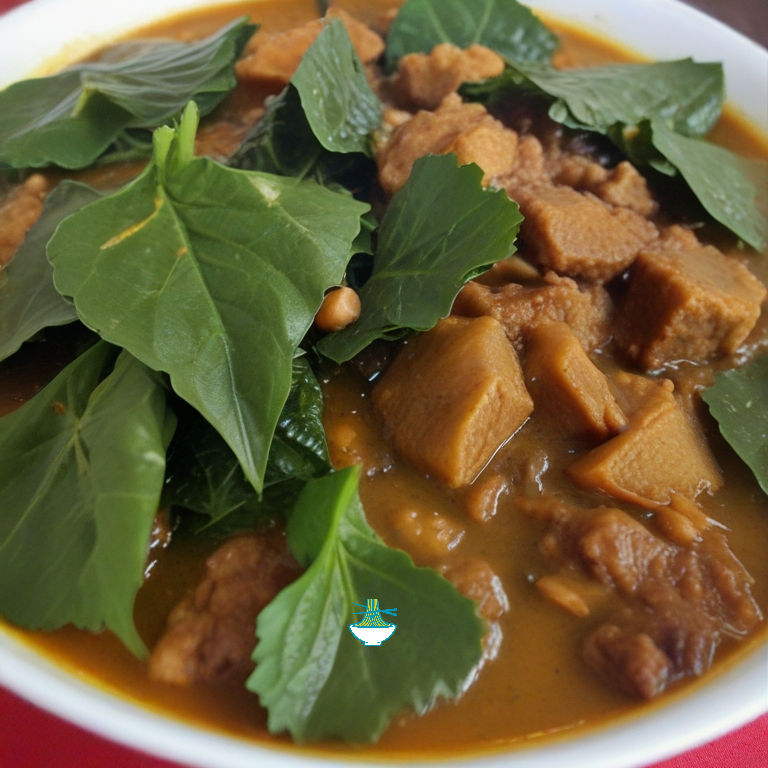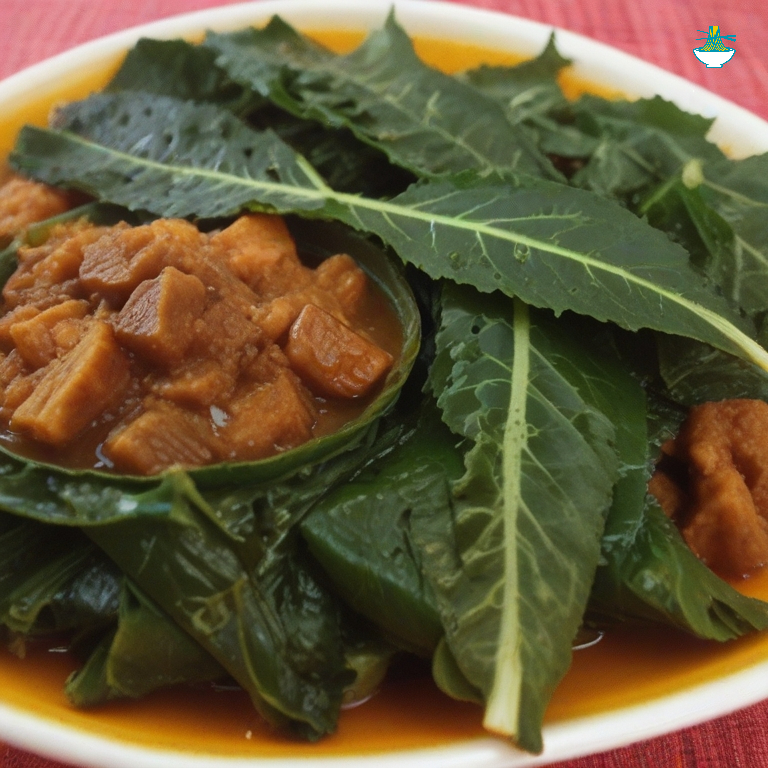Chibwabwa is a traditional Zambian dish that features pumpkin leaves cooked with groundnuts and sometimes meat. It's known for its flavorful combination of ingredients and is often served alongside staples like nshima or rice. This dish has deep roots in Zambian cuisine, reflecting the use of local ingredients and traditional cooking methods that have been passed down through generations. It's a popular choice for both everyday meals and special occasions, highlighting the rich culinary heritage of Zambia.
Ingredients:
- 500g pumpkin leaves
- 1 cup groundnuts (peanuts), roasted and ground
- 1 onion, finely chopped
- 2 tomatoes, chopped
- 2 tablespoons cooking oil
- Salt to taste
- Optional: meat (such as beef or chicken), chopped into small pieces
Method:
1. Wash the pumpkin leaves thoroughly and chop them finely.
2. In a large pot, heat the cooking oil over medium heat.
3. Add the chopped onion and sauté until golden brown.
4. If using meat, add it to the pot and cook until browned.
5. Add the chopped tomatoes and cook until they soften.
6. Add the groundnuts (peanuts) and stir well to combine.
7. Add the chopped pumpkin leaves and stir-fry for about 5-7 minutes until they wilt and become tender.
8. Season with salt to taste.
9. Serve hot with nshima or rice.
Nutrition Value:
1. 500g Pumpkin Leaves:
- Calories: Approximately 50 calories
- Carbohydrates: About 8 grams
- Protein: Around 5 grams
- Fat: Less than 1 gram
- Sodium: Very low, typically less than 5 milligrams
- Cholesterol: Zero
- Vitamins: High in vitamin A, C, K, and folate
- Minerals: Contains iron, calcium, magnesium, and potassium
- Nutritional Benefits: Pumpkin leaves are rich in antioxidants, vitamins, and minerals, promoting eye health, immune function, and overall well-being.
2. 1 cup Groundnuts (Peanuts), Roasted and Ground:
- Calories: Approximately 800 calories
- Carbohydrates: About 30 grams
- Protein: Around 35 grams
- Fat: About 70 grams (mostly healthy fats)
- Sodium: Low, typically less than 10 milligrams
- Cholesterol: Zero
- Vitamins: High in vitamin E, niacin, and folate
- Minerals: Contains magnesium, phosphorus, and zinc
- Nutritional Benefits: Groundnuts provide energy, healthy fats, protein, and essential nutrients like vitamin E and magnesium, supporting heart health, brain function, and muscle growth.
3. 1 Onion, Finely Chopped:
- Calories: Approximately 45 calories
- Carbohydrates: About 11 grams
- Protein: Around 1 gram
- Fat: Almost negligible
- Sodium: Very low, typically less than 5 milligrams
- Cholesterol: Zero
- Vitamins: Contains vitamin C and B6
- Minerals: Provides small amounts of potassium and manganese
- Nutritional Benefits: Onions add flavor and nutrients like vitamin C and antioxidants to the dish, supporting immune function and reducing inflammation.
4. 2 Tomatoes, Chopped:
- Calories: Approximately 30 calories
- Carbohydrates: About 7 grams
- Protein: Around 1 gram
- Fat: Almost negligible
- Sodium: Very low, typically less than 5 milligrams
- Cholesterol: Zero
- Vitamins: High in vitamin C, A, and K
- Minerals: Contains potassium and small amounts of calcium and magnesium
- Nutritional Benefits: Tomatoes are rich in antioxidants like lycopene, vitamins, and minerals, supporting heart health, skin health, and vision.
5. 2 Tablespoons Cooking Oil:
- Calories: Approximately 240 calories
- Carbohydrates: Zero
- Protein: Zero
- Fat: About 28 grams
- Sodium: Very low, typically less than 5 milligrams
- Cholesterol: Zero
- Vitamins: May contain vitamin E, depending on the type of oil
- Minerals: Minimal
- Nutritional Benefits: Cooking oil provides energy and helps in the absorption of fat-soluble vitamins, but excessive consumption can contribute to calorie intake.
6. Salt to Taste:
- Calories: Zero
- Carbohydrates: Zero
- Protein: Zero
- Fat: Zero
- Sodium: Varies based on amount used
- Cholesterol: Zero
- Vitamins: Zero
- Minerals: Sodium content
- Nutritional Benefits: Salt enhances flavor but should be used in moderation to avoid excessive sodium intake, which can contribute to high blood pressure and other health issues.
7. Optional: Meat (Such as Beef or Chicken), Chopped into Small Pieces:
- Nutritional values vary based on the type and cut of meat used.
- Calories: Varies (approximately 150-250 calories per 100 grams of lean meat)
- Carbohydrates: Minimal to zero
- Protein: High (approximately 20-30 grams per 100 grams of lean meat)
- Fat: Varies based on lean/fat content
- Sodium: Varies based on preparation
- Cholesterol: Varies based on meat type and cut
- Vitamins: Contains B vitamins (B12, B6, niacin), iron, and zinc
- Minerals: Provides iron, zinc, and phosphorus
- Nutritional Benefits: Meat adds protein, essential amino acids, iron, and other nutrients important for muscle function, energy production, and overall health. However, excessive consumption of fatty meats can contribute to cholesterol and health risks.


Comments